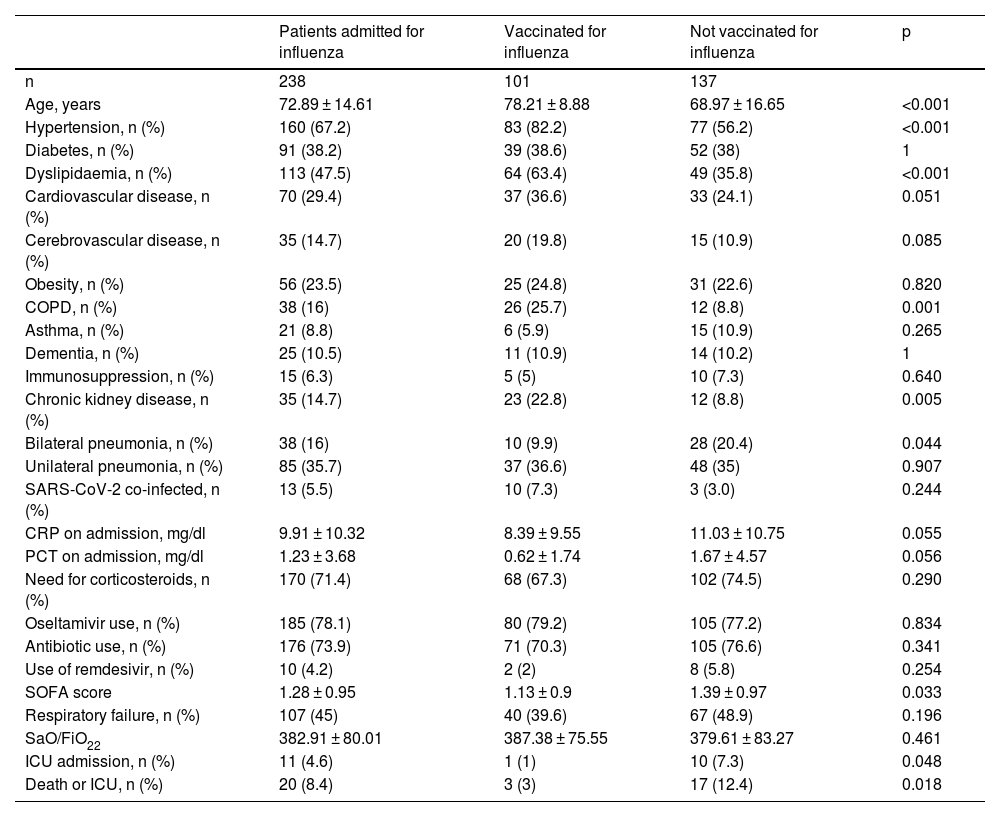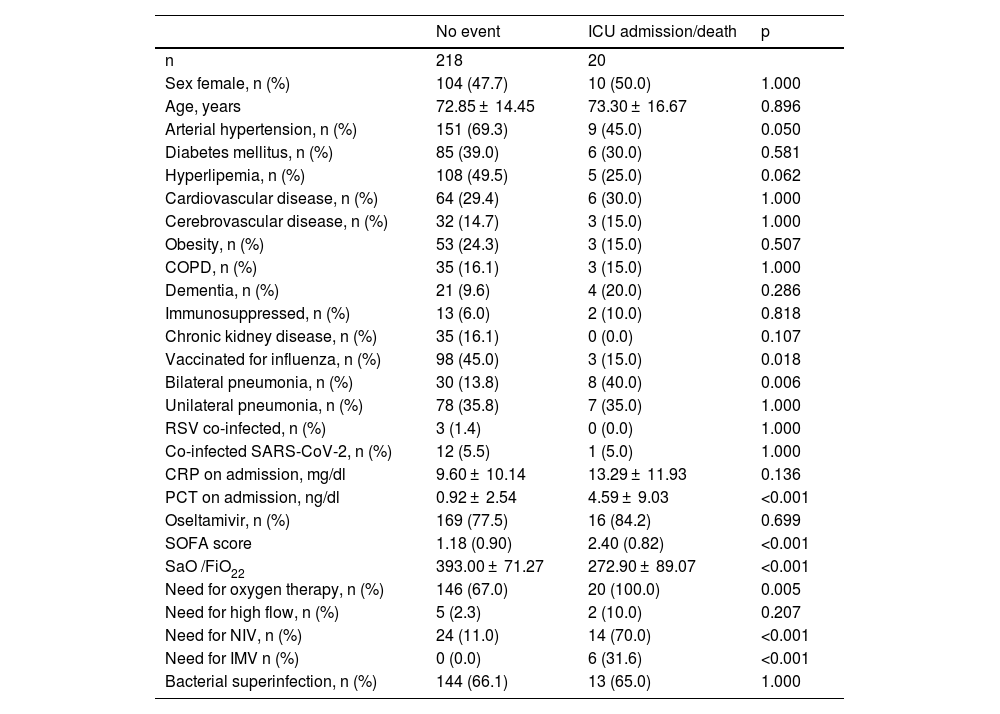Vaccination against influenza is widespread worldwide, reducing complications associated with infection. However, the impact of vaccination on mortality/ ICU admission in hospitalised patients has been little studied.
Material and methodsA retrospective observational study was conducted on 238 patients hospitalised for influenza from October 2023 to January 2024 to evaluate the vaccine's effectiveness in terms of the combined event of ICU admission/mortality during hospitalisation. Additionally, the characteristics of vaccinated patients and the existence of bacterial superinfection were analyzed. Cox regression was performed using the SPSS program and the free "R" software.
ResultsA total of 238 patients were included. Those vaccinated were older (78,2 ± 8,8 vs 69,97 ± 16,6 years; p < 0,001) and were more likely to have hypertension (82,2% vs 56,2%; p < 0,001), cardiovascular disease (36,6% vs 24,1%; p = 0,05), chronic bronchopathy (25,7% vs 8,8%; p = 0,001), or chronic kidney disease (22,8% vs 8,8%; p = 0,005). They had lower levels of CRP (8,39 ± 9,55 vs 11,03 ± 10,75 mg/dl; p = 0,05), procalcitonin (0,62 ± 1,74 vs 1,67 ± 4,57 ng/dl; p = 0,05), and SOFA scores (1,13 ± 0,9 vs 1,39 ± 0,97; p = 0,033). 11 patients were admitted to ICU (4,6%) and 11 died (4,6%). Influenza vaccination was associated as a protective factor against ICU admission/mortality in the Cox regression (HR = 0,216; 95% CI 0,062–0,759, p = 0,017). The presence of bacterial superinfection was similar between vaccinated and unvaccinated patients (63,4% vs 67,9%; p = 0,556).
ConclusionsInfluenza vaccination may reduces the probability of ICU admission or death. This effect is likely due to better control of the immune response. We did not observe any relationship with the risk of presenting bacterial superinfection.
La vacunación frente a la gripe está extendida a nivel mundial reduciendo las complicaciones asociadas a la infección. Poco ha sido estudiado el impacto de dicha vacunación en la mortalidad/ingreso en UCI en pacientes hospitalizados.
Material y métodosSe realizó un estudio observacional retrospectivo en 238 pacientes hospitalizados por influenza desde octubre de 2023 a enero de 2024 para evaluar la efectividad vacunal en cuanto al evento combinado ingreso en UCI/mortalidad durante el ingreso. Además, se analiza las características de los pacientes vacunados y la existencia de sobreinfección bacteriana. Se realizó regresión de Cox. Se utilizó el programa SPSS y el software de «R».
ResultadosLos pacientes vacunados eran de mayor edad (78,2 ± 8,8 vs 69,97 ± 16,6 años; p < 0,001) y presentaban: hipertensión (82,2% vs 56,2%; p < 0,001), enfermedad cardiovascular (36,6% vs 24,1%; p = 0,05), broncopatía crónica (25,7% vs 8,8%; p = 0,001), enfermedad renal crónica (22,8% vs 8,8%; p = 0,005), niveles más bajos de PCR (8,39 ± 9,55 vs 11,03 ± 10,75 mg/dl; p = 0,05), procalcitonina (0,62 ± 1,74 vs 1,67 ± 4,57 ng/dl; p = 0,05), SOFA (1,13 ± 0,9 vs 1,39 ± 0,97; p = 0,033). Ingresaron en UCI 11 pacientes (4,6%) y fallecieron 11 (4,6%). La vacunación de la gripe se asoció como factor protector al ingreso en la UCI/exitus (HR = 0,216; IC95% 0,062–0,759, p = 0,017). La sobreinfección bacteriana fue similar entre los vacunados y no vacunados (63,4% vs 67,9%; p = 0,556).
ConclusionesLa vacunación de la gripe podría reducir de forma significativa la probabilidad de ingresar en UCI o fallecer. Este efecto probablemente se deba a un mejor control de la respuesta inmunológica. No observamos relación con presentar sobreinfección bacteriana.










